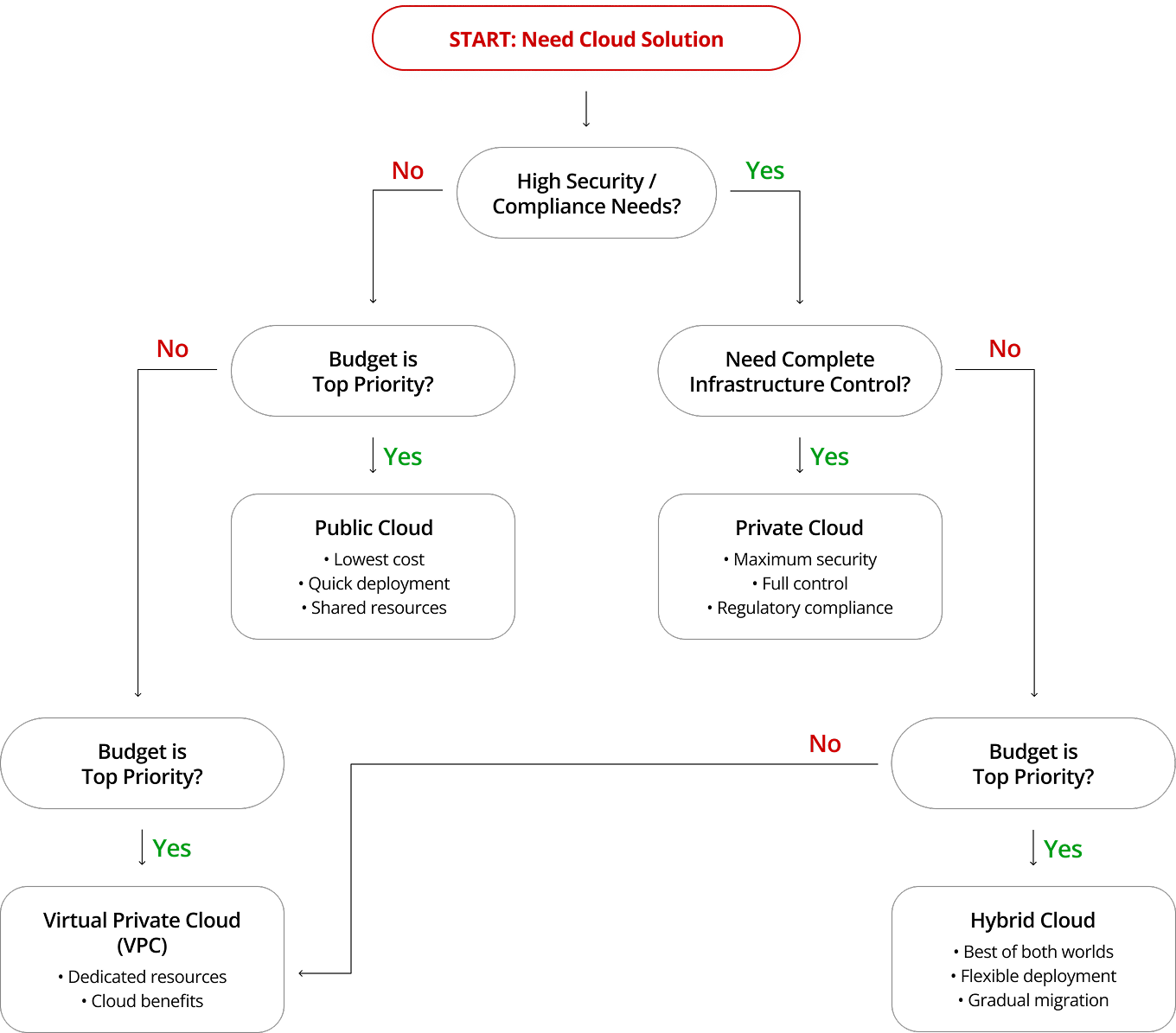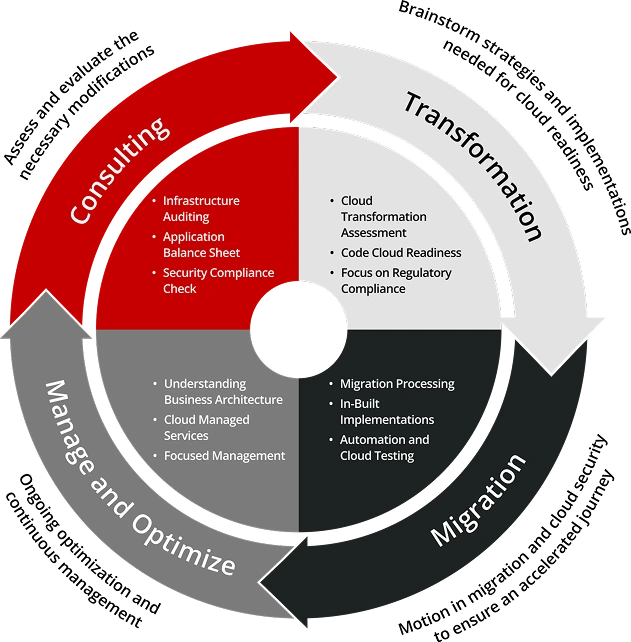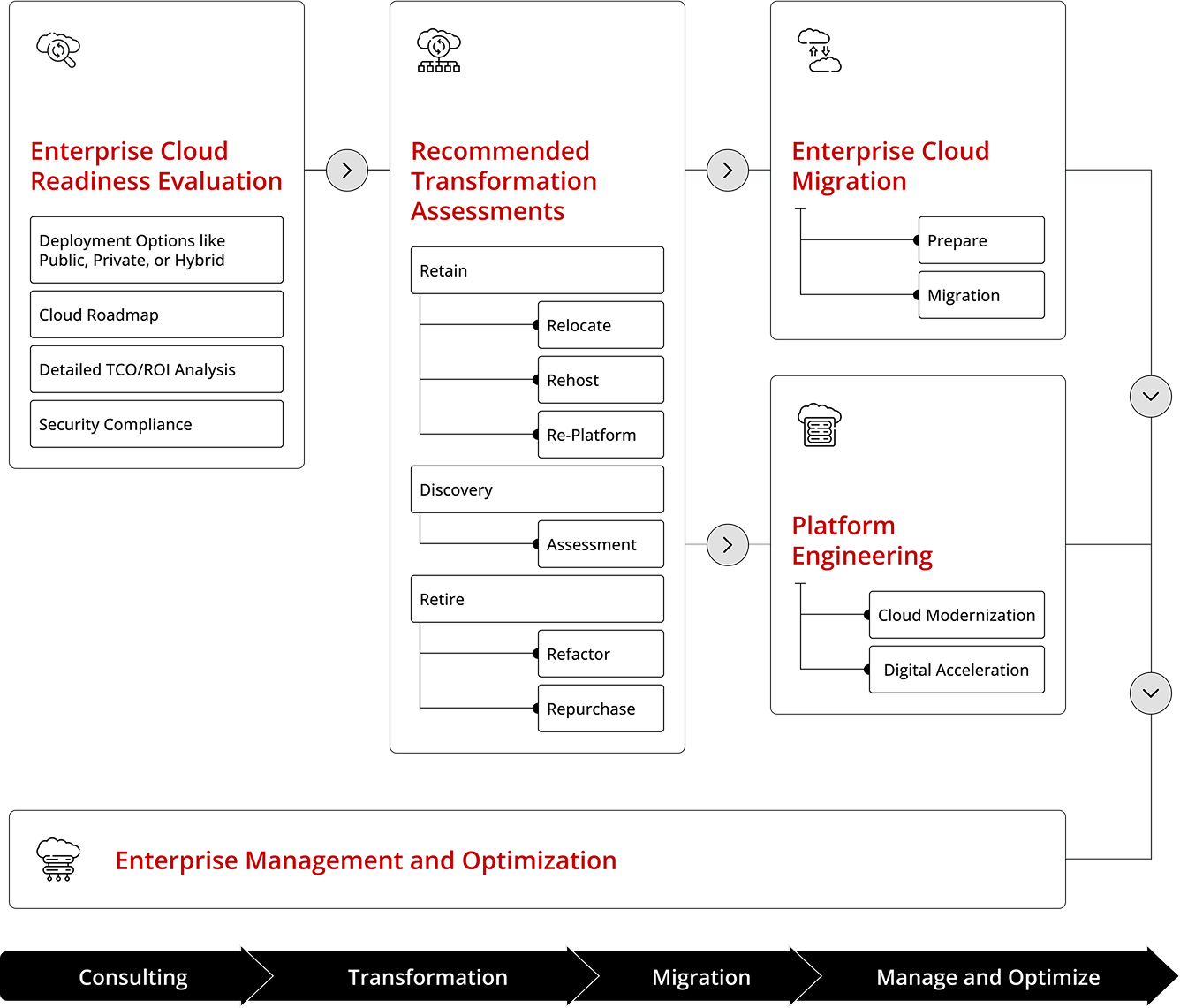
Chief Executive Officer
Enterprises choose our cloud enterprise services to upturn their numbers and bring forth a business outcome-focused change.
Uptime Reliability
Custom-Built Solutions
Cost Optimization
Deployment Success
Faster Time-to-Market
Repeat Engagement
At SparxIT, a cloud-focused enabler, we modernize existing business models with enterprise-grade agility and intelligent automation, with futuristic enterprise cloud solutions for building new revenue streams.
We assist enterprises by performing gap analysis and workload assessment, recommending an appropriate operating model and enterprise cloud platforms like AWS, GCP, and Azure with organization-focused consulting. We enable decision-making with detailed TCO/ROI analysis for migration and modernization efforts, and design a transformation roadmap.
We refactor monolithic systems into containerized microservices for serverless architecture, replacing tightly coupled services for building future-ready solutions and an interdependence-free system. We also implement software-defined infrastructure using industry-wide preferred tools like Terraform or AWS CloudFormation.
Our enterprise experts assist with enterprise cloud migration strategy for modernizing on-premise databases to managed services like Amazon RDS or Cloud Spanner to ensure lift-and-shift or re-platform migration with no business disruption. Using schema conversion tools and data validation pipelines, we ensure high-fidelity migration and perform blue-green deployments to mitigate downtime.
Our cloud-focused app developers build robust, scalable, and platform-agnostic applications by adopting DevSecOps pipelines with CI/CD tools like Jenkins and ArgoCD to bring forth workflow efficacy. For event-driven microservices, we use serverless platforms like AWS Lambda, Azure Functions, and Cloud Run and bring forth agility-centric and technology-powered enterprise apps.
To ensure security-focused enterprise cloud design, we architect fault-tolerant systems by utilizing design patterns like bulkheads, circuit breakers, and retries. We also integrate cloud solutions with identity providers like SAML, OAuth2, and OpenID for future scalability and business continuity.
Our experts architect multi-cloud strategies to prevent vendor lock-in and improve availability, focusing on future-ready blueprints for business and technology convergence. By incorporating data mesh and lakehouse architectures for distributed data governance, we align cloud infrastructure with long-term product, compliance, and financial goals.
Accelerating cloud velocity with intelligent automation for real-time monitoring, achieving defined SLOs/SLAs, automation of release pipeline, and infrastructure lifecycle management through GitOps, IaC, and dynamic secrets provisioning. Our experts focus on incident resolution automation and incident postmortems with Prometheus-Grafana.
Strengthening business trust, mitigating risk, and ensuring secure scalability under strict regulatory frameworks like HIPAA and GDPR to embed enterprise-grade security into every cloud layer. We focus on IAM policy design, zero-trust network models, regulatory compliance enforcement with automated audit trails, and real-time threat detection with SIEM/SOAR integration.
Bring future-ready cloud environments into your system and modify the enterprise workflow.
Modernize to Cloud Today!Our experts at SparxIT bring forth enterprise-specific modifications with digital innovation benefits for building new revenue streams and driving optimal results.
At SparxIT, we assist enterprises in introducing effective cloud service models, IaaS, PaaS, and SaaS, for their business operational needs and resource capabilities.
 Virtual machines & servers
Virtual machines & servers Storage & networking
Storage & networking Operating systems
Operating systems Most control & flexibility
Most control & flexibility You manage: OS, runtime, apps
You manage: OS, runtime, apps Development platform
Development platform Runtime environment
Runtime environment Database management
Database management Balanced control
Balanced control You manage: applications & data
You manage: applications & data Ready-to-use applications
Ready-to-use applications Web-based access
Web-based access Automatic updates
Automatic updates Least control, most convenience
Least control, most convenience You manage: user data only
You manage: user data only


Let SparxIT take over the complexity of managing your enterprise cloud environment, from infrastructure to optimization, so you can focus on innovation and growth.
Switch to Cloud TodayAs a top enterprise cloud provider, we assist businesses in welcoming the future-ready change with our cloud-native environment implementation and modify the organization's operations. Focusing on new platform combinations, fitting technology allocation, and working on idle resources, we enable continuous agility, final cloud cost optimization, and streamlined workflow for maximizing revenue game.

We go beyond basic cloud enablement to engineer resilient, scalable, and intelligent cloud ecosystems customized to enterprise-grade requirements.
Select an engagement model that best fits your budget and cloud-focused modernization project needs.
Ideal for well-defined cloud initiatives with clear requirements and deliverables.
Engage a specialized cloud team working exclusively on your enterprise project.
Best for evolving cloud programs where flexibility and iterative improvements are required.

We bring forth a technology stack that assists enterprises in augmenting their business results and outcomes.
 AWS
AWS Microsoft Azure
Microsoft Azure Google Cloud Platform (GCP)
Google Cloud Platform (GCP) Docker
Docker Kubernetes
Kubernetes Helm
Helm OpenShift
OpenShift Terraform
Terraform AWS CloudFormation
AWS CloudFormation Pulumi
Pulumi Ansible
Ansible Jenkins
Jenkins GitLab CI/CD
GitLab CI/CD GitHub Actions
GitHub Actions Argo CD
Argo CD Prometheus
Prometheus Grafana
Grafana ELK Stack (Elasticsearch, Logstash, Kibana)
ELK Stack (Elasticsearch, Logstash, Kibana) Datadog
Datadog New Relic
New Relic AWS Lambda
AWS Lambda Azure Functions
Azure Functions Google Cloud Functions
Google Cloud Functions EventBridge
EventBridge Ansible
Ansible Chef
Chef Puppet
Puppet SaltStack
SaltStackVikash Sharma, CEO of SparxIT
Connect with ExpertsAt SparxIT, we follow a systematic approach to building cloud enterprise solutions, focusing on data integrity and value-driven modernization.

We ensure that the cost of enterprise cloud computing depends on the solution complexity, project requirements, project type, features you want to add, and other factors.
Let’s Talk About Your Cloud Goals
Contact NowCloud computing and enterprise cloud computing may sound similar, but they cater to very different needs. While cloud computing is a broad term for delivering computing services, like storage, servers, databases, and software, over the internet, enterprise cloud computing is tailored for large organizations with complex, mission-critical operations. The key difference lies in scale, customization, governance, and compliance.
In other words, cloud computing is for anyone, but enterprise cloud computing is purpose-built for businesses that need advanced security, deep integration with legacy systems, and guaranteed high performance at scale.
| Aspect | Cloud Computing | Enterprise Cloud Computing |
|---|---|---|
| Target Users | General consumers, startups, and small to medium businesses | Large-scale enterprises with complex IT needs |
| Deployment Models | Public cloud (AWS, Azure, GCP), hybrid, or private | Typically, hybrid or private with enterprise-grade controls |
| Customization | Limited customization, standardized services | Highly customizable to meet industry-specific and organizational requirements |
| Security & Compliance | To advance security, compliance depends on the provider | Advanced, compliance-driven security with industry certifications (HIPAA, GDPR, ISO, etc.) |
| Scalability | Scaled easily based on demand | Scales with high performance, reliability, and multi-region redundancy |
| Cost Model | Pay-as-you-go, flexible for smaller workloads | Enterprise contracts with negotiated pricing and resource commitments |
| Management & Governance | Provider-managed, minimal governance tools | Robust governance, access controls, and monitoring for enterprise IT policies |
| Integration | Basic integrations with common apps and services | Deep integration with enterprise software, ERP, CRM, and legacy systems |
| Support | Standard customer support tiers | Dedicated account managers, 24/7 priority enterprise support |
| Performance SLAs | Standard performance SLAs | High-availability SLAs with guaranteed uptime (99.99% or higher) |
Enterprise cloud refers to cloud computing solutions that are specifically architected, scaled, and secured to meet the complex, large-scale, and compliance-driven needs of enterprises. These services bring forth organization-specific capabilities, including infrastructure (IaaS), platform (PaaS), and software (SaaS), delivered via public, private, hybrid, or multi-cloud environments.
To bring the difference between them and regular services, transforming enterprise cloud services supports mission-critical applications, large data volumes, global deployments, and strict governance. They are often customized for high availability, architecture design, and integration with legacy systems, while offering advanced security, monitoring, and compliance features.
To understand the difference for comparison, take a look at the table below.
| Aspect | Enterprise Cloud Services | Regular Cloud Services |
|---|---|---|
| Target Users | Large enterprises, regulated industries | Individuals, startups, SMBs |
| Architecture | Custom, scalable (multi-cloud, hybrid, microservices) | Standardized, single-cloud |
| Security & Compliance | Implementing Zero-Trust architecture with encryption, role-based access, and industry compliance | Basic controls, limited compliance support |
| Performance & Uptime | SLA-backed high availability (e.g., 99.99%), DR-ready | Basic uptime guarantees |
| Monitoring & Automation | Full-stack observability, IaC, CI/CD, AIOps | Basic logs and manual processes |
| Support Model | 24/7 dedicated enterprise support, technical account management | General or ticket-based support |
| Cost & Governance | FinOps tools, usage optimization, and centralized billing | Simple pricing, limited cost controls |
Choosing the right enterprise cloud solution is not about picking the most popular platform but about selecting the one that aligns with your business goals, operational demands, and innovation roadmap. A well-informed decision today lays the foundation for agility, security, and digital leadership tomorrow.
Categorize your workloads, compute-intensive, data-heavy, real-time, or latency-sensitive, to determine the right architecture (public, private, hybrid, or multi-cloud).
Choose a solution that supports elastic scaling, auto-provisioning, and global availability zones to maintain uptime and user experience under variable loads.
Ensure the platform offers Zero Trust security, robust IAM, encryption at rest and in transit, and compliance with regulations like HIPAA, GDPR, or SOC 2.
The right cloud solution should seamlessly integrate with your current enterprise software (ERP, CRM, on-prem systems) without disrupting operations.
Look for solutions that offer workload portability, open standards, and support for containerized and cloud-agnostic architectures.
Analyze the pricing structure (pay-as-you-go, reserved instances, etc.) and whether the platform offers tools for cost tracking, rightsizing, and FinOps.
Choose providers with enterprise-grade SLAs, 24/7 support, and proactive account management to minimize operational risks.
Consider long-term capabilities like AI/ML integration, edge computing, serverless frameworks, and support for industry-specific services.


AWS, Azure, and Google Cloud offer robust regulatory support. We help you choose the best-fit provider based on your compliance needs, such as HIPAA, GDPR, SOC 2, or FedRAMP.


Enterprise architecture aligns cloud migration with business goals. It simplifies legacy modernization, improves system integration, ensures scalability, and reduces risk during the migration process.


For enterprises, AWS Lambda, Azure Functions, and Google Cloud Functions are top choices. They offer robust scalability, high availability, strong integration with enterprise tools, and built-in security, making them ideal for event-driven workloads and microservices architectures.


Cloud storage offers enterprise-grade security, including encryption, identity management, and compliance controls, often surpassing traditional on-premise setups. However, enterprise storage provides greater control and customization, making it suitable for industries with strict data residency or regulatory needs.
Let’s create something extraordinary together.

Explore our latest blogs - a blend of curated content, and trends. Stay informed, and inspired!
Migrating to the cloud may open many business opportunities, including improved collaboration, real-time scalability, data-driven insights, and strengthened security …
Written by:
Chief Executive Officer
Cloud ERP integration connects various cloud-based business applications with your ERP system to create a unified, efficient ecosystem …
Written by: